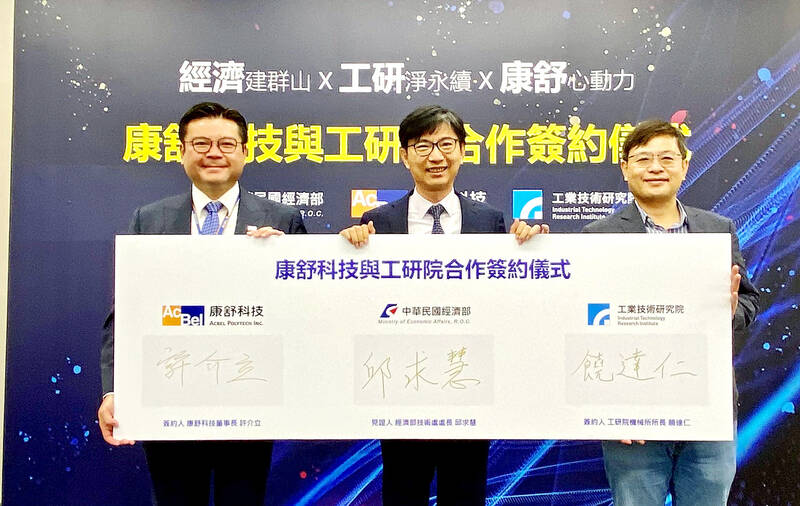The Industrial Technology Research Institute (ITRI, 工研院) and power management company AcBel Polytech Inc (康舒科技) on Tuesday signed a contract in a bid to develop next-generation electric vehicle power devices, the Ministry of Economic Affairs said.
The NT$44 million (US$1.37 million) joint investment plan to develop silicon carbide technologies would be subsidized by the government, the ministry said.
Silicon carbide is a high-efficiency semiconductor material that can help lower power consumption, the ITRI said, adding that similar projects would also fall under the partnership involving Fukuta Electric & Machinery Co (富田電機) and DiodSent Green Technology Co (達信綠能).

Photo courtesy of AcBel Polytech Inc
The ministry said it would invest NT$5 billion from next year to 2026 in the development of electric vehicles and their components, with the funds also to be used to develop system integration platforms and boost electric vehicle testing capacity, the ITRI added.
Global sales of new electric passenger vehicles would surpass those of internal combustion models by 2037, creating an output value of US$2.1 trillion, the ministry said.
The output value of Taiwan’s automobile industry reached NT$300 billion last year and is expected to double by 2025, it said.

The demise of the coal industry left the US’ Appalachian region in tatters, with lost jobs, spoiled water and countless kilometers of abandoned underground mines. Now entrepreneurs are eyeing the rural region with ambitious visions to rebuild its economy by converting old mines into solar power systems and data centers that could help fuel the increasing power demands of the artificial intelligence (AI) boom. One such project is underway by a non-profit team calling itself Energy DELTA (Discovery, Education, Learning and Technology Accelerator) Lab, which is looking to develop energy sources on about 26,305 hectares of old coal land in

Taiwan’s exports soared 56 percent year-on-year to an all-time high of US$64.05 billion last month, propelled by surging global demand for artificial intelligence (AI), high-performance computing and cloud service infrastructure, the Ministry of Finance said yesterday. Department of Statistics Director-General Beatrice Tsai (蔡美娜) called the figure an unexpected upside surprise, citing a wave of technology orders from overseas customers alongside the usual year-end shopping season for technology products. Growth is likely to remain strong this month, she said, projecting a 40 percent to 45 percent expansion on an annual basis. The outperformance could prompt the Directorate-General of Budget, Accounting and

Netflix on Friday faced fierce criticism over its blockbuster deal to acquire Warner Bros Discovery. The streaming giant is already viewed as a pariah in some Hollywood circles, largely due to its reluctance to release content in theaters and its disruption of traditional industry practices. As Netflix emerged as the likely winning bidder for Warner Bros — the studio behind Casablanca, the Harry Potter movies and Friends — Hollywood’s elite launched an aggressive campaign against the acquisition. Titanic director James Cameron called the buyout a “disaster,” while a group of prominent producers are lobbying US Congress to oppose the deal,

Two Chinese chipmakers are attracting strong retail investor demand, buoyed by industry peer Moore Threads Technology Co’s (摩爾線程) stellar debut. The retail portion of MetaX Integrated Circuits (Shanghai) Co’s (上海沐曦) upcoming initial public offering (IPO) was 2,986 times oversubscribed on Friday, according to a filing. Meanwhile, Beijing Onmicro Electronics Co (北京昂瑞微), which makes radio frequency chips, was 2,899 times oversubscribed on Friday, its filing showed. The bids coincided with Moore Threads’ trading debut, which surged 425 percent on Friday after raising 8 billion yuan (US$1.13 billion) on bets that the company could emerge as a viable local competitor to Nvidia